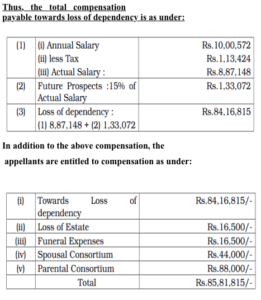 New Delhi, Oct 25 (IANS)
New Delhi, Oct 25 (IANS)
The Supreme Court on Monday said a mother-in-law, who is residing with her son-in-law, is a legal representative under the provision of the Motor Vehicles Act, and entitled to maintain a claim petition, as it said that the Act is a benevolent legislation enacted for the object of providing monetary relief to the victims or their families.
A bench of Justices S. Abdul Nazeer and Krishna Murari said: “Appellant no 4 (mother-in-law) herein may not be a legal heir of the deceased, but she certainly suffered on account of his death. Therefore, we have no hesitation to hold that she is a ‘legal representative’ under Section 166 of the MV Act and is entitled to maintain a claim petition.”
The bench emphasized that the term “legal representative should be given a wider interpretation for the purpose of Chapter XII of MV Act, and it should not be confined only to mean the spouse, parents, and children of the deceased”.
The top court said it is not uncommon for a mother-in-law to live with her daughter and son-in-law, during old age, in Indian society, and also, be dependent upon her son-in-law for her maintenance, it added.
The bench said the MV Act does not define the term “legal representative”, which, generally, means a person who in law represents the estate of the deceased person and includes any person or persons in whom legal right to receive compensatory benefit vests.
“A ‘legal representative’ may also include any person who intermeddles with the estate of the deceased. Such a person does not necessarily have to be a legal heir. Legal heirs are the persons who are entitled to inherit the surviving estate of the deceased. A legal heir may also be a legal representative,” it said.
The Motor Accident Claims Tribunal had awarded Rs 74,50,971, as compensation, to the family of the deceased, but the Kerala High Court had reduced it to Rs 48,39,728, holding the mother-in-law residing with her son-in-law was not a legal representative.
The wife of the man, who died in 2011 in a motor vehicle accident, filed an appeal in the Supreme Court.
The top court said: “Section 168 of the MV Act deals with the concept of ‘just compensation’ which ought to be determined on the foundation of fairness, reasonableness, and equitability”.
It observed the deceased was aged 52 years and was working as an assistant professor, with a monthly salary of Rs 83,831 as it enhanced the compensation to Rs 85,81,815. The bench said the appellants are also entitled to interest on the amount at the rate of 7.5 per cent per annum from the date of the claim petition till the date of its realisation.
Thus, the total compensation payable towards loss of dependency is as under:
In addition to the above compensation, the appellants are entitled to compensation as under:
